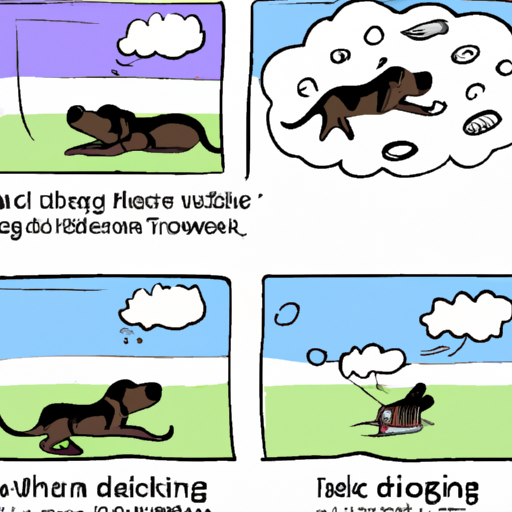Understanding Your Dog’s Sleep Cycle
Just like humans, your beloved dogs also have their own sleep cycles. Dogs enter a stage of sleep known as Rapid Eye Movement (REM), where dreaming typically occurs. It’s in this stage where you may notice your dogs whimpering, twitching, or even ‘running’ in their sleep.
Table: Dog Sleep Cycle
| Stage | Description |
|---|---|
| Light Sleep | Breathing slows, heart rate decreases |
| Deep Sleep | Full body relaxation, lower sensitivity to noise |
| REM Sleep | Eye movements, potential for dreaming and noises |
What Could Dogs Potentially Be Dreaming About?
Dogs could dream about a myriad of things, much like humans do. Here are a few possibilities:
- Day’s events: Just like us, dogs may dream about their day. This could include their walk in the park, the new toy they played with or the squirrel they chased.
- Past memories: Dogs may dream about their past, remembering previous homes, experiences or owners.
- Inherent instincts: Dogs may dream about things related to their inherent instincts, like chasing prey or guarding their territory.
Why Do Dogs Cry in Their Sleep?
- Dream content: Dogs may whimper or cry in their sleep if they’re having a distressing dream.
- Physical discomfort: If your dog is unwell or uncomfortable, they might cry in their sleep.
- Anxiety or stress: Dogs suffering from separation anxiety or stress may whimper or cry in their sleep.
What Actions Should You Take?
When you notice your dog crying or whimpering in their sleep, it’s vital to observe before you intervene. Here’s what you can do:
- Allow them to sleep: If the crying is brief and your dog appears to be in deep sleep, it’s best not to wake them. They’re likely just having a dream and will settle shortly.
- Check for discomfort: If your dog’s crying persists, they might be in pain. Check for any signs of injury or discomfort.
- Consult a vet: If the crying continues over multiple nights, it’s time to consult a vet.
Can Dogs Have Nightmares?
Yes, dogs can have nightmares. It’s believed that these nightmares could be related to past traumas or fears. If your dog seems to be having frequent nightmares, it’s recommended to consult with a veterinarian.
FAQs
Q: Can I wake my dog if they’re crying in their sleep?
A: It’s best not to as they’re likely just dreaming. However, prolonged crying may indicate discomfort and should be addressed.
Q: How much should my dog sleep?
A: Depending on their age, breed and health, dogs typically sleep for 12-14 hours per day.
Q: Can dogs sleep through the night without crying?
A: Yes, most dogs sleep through the night without any issues. If your dog frequently cries at night, it may be worth discussing with your vet.
Q: Do puppies dream more than adult dogs?
A: Yes, puppies enter REM sleep more often than adult dogs, which means they have more opportunities to dream.
Q: How can I make my dog’s sleep more comfortable?
A: Ensure they have a comfortable sleeping area, keep their sleep environment quiet and calm, and maintain a consistent sleep schedule.



